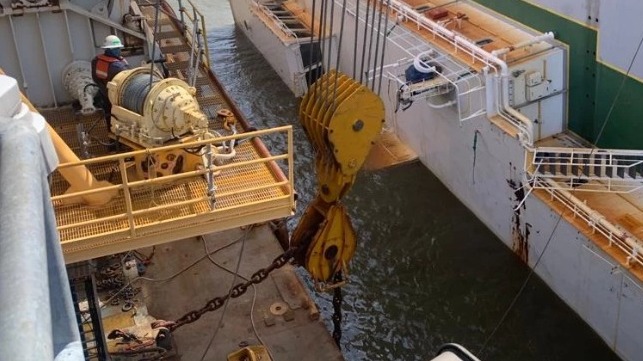Photos: Work Begins on Fourth Cut Through the Hull of the Golden Ray

After encountering trouble with chain breakage on the third cut, salvors have commenced operations on the fourth cut through the hull of the grounded ro/ro Golden Ray.
After a challenging month-long effort on the third cut, salvors were forced to stop work and shift to the fourth cut due to another broken chain link - the latest in a series of link and connecting link breakages during operations. The breakage took the chain out of the cut groove, and divers will have to install a system to put the chain back in place.
In the meantime, the heavy lift barge VB 10000 has moved on from the incomplete third cut to work on the fourth cut in the series, moving the project forward while the dive operation on the third cut progresses. Work on the fourth cut began on Sunday, and the cutting chain has already progressed above the waterline on the vessel's top deck (a vertical surface, as the vessel rests on her side).

Salvors attach slings to lifting lugs to Section Two, which is next in line for removal (St. Simons Sound Incident Response)

Rigging the cutting gear for the fourth cut (St. Simons Sound Incident Response)

Cutting progress on Sunday (St. Simons Sound Incident Response)

Spill response vessel at the wreck site (St. Simons Sound Incident Response)

that matters most
Get the latest maritime news delivered to your inbox daily.
The deck barge Julie B is expected to arrive at the site this week and will receive the separated section once the fourth cut is completed. The salvage engineers are still collecting data from fixed monitors and hydrographic surveys, and they confirm that the wreck remains stable.
The Golden Ray went aground and partially capsized in Georgia's St. Simons Sound on September 7, 2019. During an outbound transit in calm conditions, a routine turn to starboard turned into a runaway maneuver, ending with the vessel aground and resting on her side. Lt. Ian Oviatt, a staff engineer at the Coast Guard Marine Safety Center, told the NTSB that the vessel had taken on too little ballast for her cargo load. “The cause of the vessel capsizing was lack of righting energy due to the way the vessel was loaded,” Oviatt told an investigative panel last September. “The vessel could have taken on additional ballast to be in compliance.”
